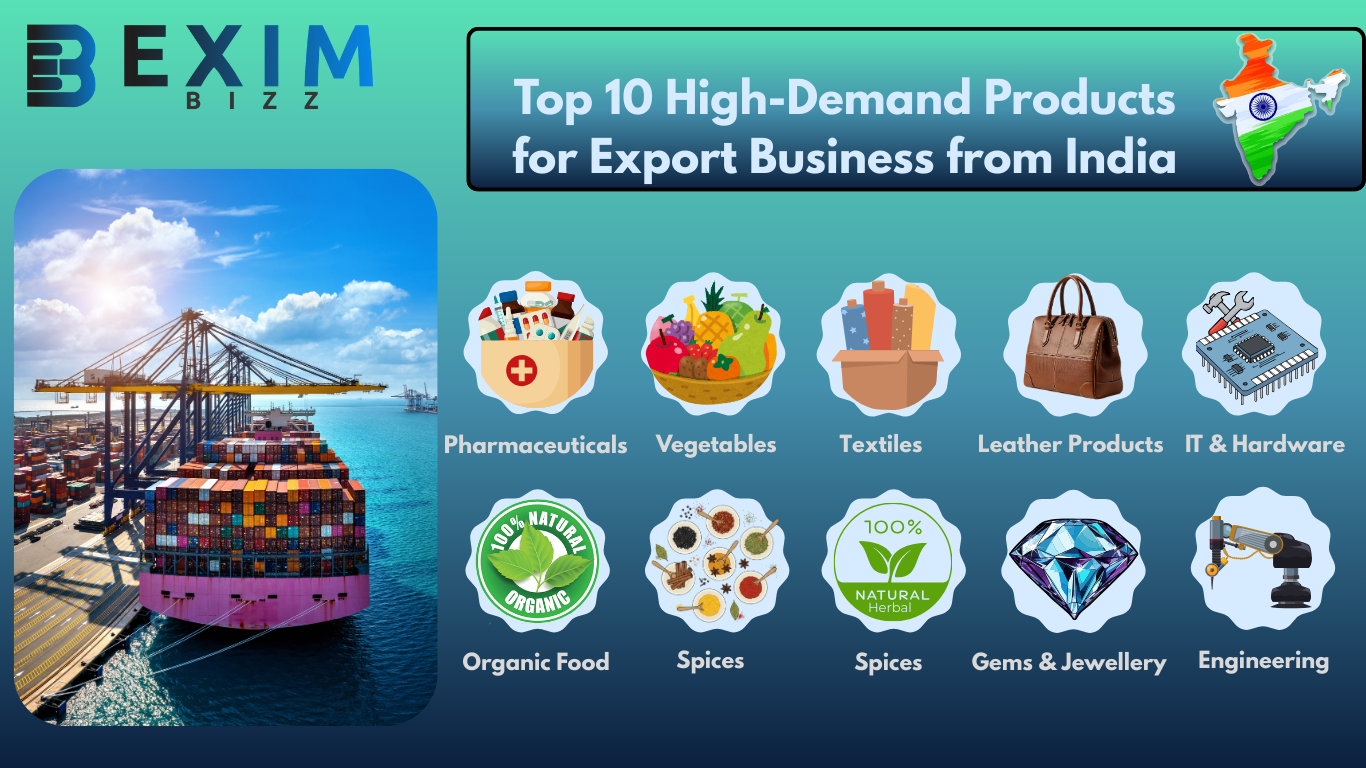Exporting goods from India—whether small product samples or large bulk shipments—is a multi-step process that involves various stakeholders, each playing a critical role in ensuring smooth delivery. Understanding how logistics works and who handles what can help you navigate the complexities of international trade more effectively.
In this blog, we’ll break down the logistics process into its key components, explain how each step is handled, and identify the parties responsible for managing them. We’ll also provide insights into how these processes differ for samples versus bulk shipments.
- Pre-Shipment Planning
Before your goods leave India, careful planning is essential to ensure compliance, cost-effectiveness, and timely delivery.
Key Activities:
- Order Preparation: Decide what needs to be shipped (samples or bulk) and prepare the goods accordingly.
- Documentation: Create necessary documents, including commercial invoices, packing lists, certificates of origin, and export licenses.
- Route Selection: Choose between air freight (faster, ideal for samples) or sea freight (cost-effective, suitable for bulk shipments).
Handled By:
- Exporter/Manufacturer: The exporter prepares the goods and ensures they meet quality standards.
- Freight Forwarder/Logistics Provider: A freight forwarder assists with documentation, route selection, and compliance with customs regulations.
- Packaging and Labeling
Proper packaging and labeling are crucial to protect your goods during transit and comply with international shipping standards.
Key Activities:
- Packaging: Use durable materials to safeguard the contents. For samples, branded packaging can enhance professionalism. For bulk shipments, pallets or containers may be used.
- Labeling: Include essential information such as addresses, barcodes, handling instructions, and country of origin.
Handled By:
- Exporter/Manufacturer: Responsible for initial packaging and labeling.
- Logistics Provider: May offer value-added services like re-packaging, labeling, or branding if required.
- Customs Clearance
Customs clearance is one of the most crucial aspect in international shipping. Incorrect documentation or non-compliance can lead to delays, fines, or even seizure of goods.
Key Activities:
- Export Declaration: File an export declaration with Indian customs authorities.
- Import Documentation: Ensure all required import documents are prepared for the destination country.
- Duties and Taxes: Calculate applicable duties and taxes based on the type of goods and destination.
Handled By:
- Customs Broker/Freight Forwarder: A customs broker or freight forwarder typically handles the paperwork and liaises with customs authorities.
- Exporter: Provides accurate details about the goods and their value.
- Transportation
Transportation is the core of logistics, involving the physical movement of goods from one place to the other destination.
Key Activities:
- Air Freight (for Samples): Ideal for urgent, lightweight shipments. Airports like Delhi, Mumbai, and Chennai serve as major hubs.
- Sea Freight (for Bulk Shipments): Cost-effective for large volumes. Major ports include Jawaharlal Nehru Port (Mumbai), Chennai Port, and Kolkata Port.
- Last-Mile Delivery: Once the goods arrive at the destination port or airport, they are transported to the final recipient via trucks or couriers.
Handled By:
- Airline/Shipping Line: Carries the goods via air or sea.
- Freight Forwarder: Coordinates transportation, consolidates shipments, and ensures timely delivery.
- Local Courier/Trucking Company: Manages last-mile delivery to the recipient.
- Tracking and Monitoring
Real-time tracking allows you to monitor your shipment’s progress and address any issues promptly.
Key Activities:
- Tracking Tools: Use online platforms provided by logistics companies to track your shipment.
- Communication: Stay in touch with the logistics provider and update your client about the shipment’s status.
Handled By:
- Logistics Provider: Offers tracking tools and updates.
- Exporter: Communicates with clients and resolves queries.
- Warehousing (Optional for Bulk Shipments)
For bulk shipments, warehousing may be required at either the origin or destination to store goods temporarily.
Key Activities:
- Storage: Goods are stored in warehouses until they are ready for dispatch.
- Inventory Management: keeping a Track record at every levels and managing stock efficiently.
Handled By:
- Third-Party Logistics (3PL) Provider: Manages warehousing and inventory.
- Exporter: Oversees storage decisions and costs.
- Post-Delivery Services
After the goods reach their destination, additional services may be required to complete the transaction.
Key Activities:
- Returns Management: Handle returns or exchanges if the recipient is dissatisfied.
- Feedback Collection: Gather feedback from the recipient to improve future shipments.
Handled By:
- Exporter/Manufacturer: Addresses returns or complaints.
- Logistics Provider: Facilitates reverse logistics if needed.
How It Differs for Samples vs. Bulk Shipments
| Aspect | Samples | Bulk Shipments |
| Size & Weight | Lightweight, small volume | Heavyweight, large volume |
| Mode of Transport | Primarily air freight | Primarily sea freight |
| Cost Sensitivity | Speed is prioritized over cost | Cost-effectiveness is prioritized over speed |
| Customs Complexity | Simpler due to lower value | More complex due to higher value and volume |
| Packaging Needs | Branded, compact packaging | Industrial-grade, robust packaging |
| Tracking Importance | Critical for quick updates | Important but less urgent |
Who Are the Key Players Involved?
- Exporter/Manufacturer: Prepares the goods, ensures quality, and initiates the shipping process.
- Freight Forwarder: Acts as the intermediary between the exporter and various logistics providers. They handle all exhaustive paperwork, customs clearance, and coordinate with the transportation ensuring safe delivery of the goods.
- Customs Authorities: Regulate the movement of goods across borders and enforce compliance with laws.
- Shipping Lines/Airlines: Physically transport the goods via sea or air.
- Warehousing Providers: Store goods temporarily if required.
- Local Couriers/Trucking Companies: Deliver goods to the final destination.
Tips for Shipping Samples and Bulk Goods from India
Here are some practical tips to ensure smooth logistics for both samples and bulk shipments:
- Understand Customs Regulations: Familiarize yourself with export documentation requirements, such as commercial invoices, packing lists, and certificates of origin. Partnering with a logistics provider that offers customs brokerage services can save you time and effort.
- Packaging Matters: Use durable packaging materials to protect your goods during transit. For samples, consider branded packaging to create a professional impression. For bulk shipments, ensure proper stacking and securing to prevent damage.
- Insurance: Insure valuable shipments, whether they’re samples or bulk goods, to safeguard against loss, theft, or damage.
- Choose the Right Mode of Transport: For small, urgent shipments like samples, air freight is usually the best option. For larger, less time-sensitive shipments, sea freight is more economical.
- Track & Communicate: Share real-time tracking updates with your clients to build trust and transparency. Regular communication helps manage expectations and address any issues promptly.
Conclusion
The logistics of sending samples and bulk quantities from India involves multiple steps and stakeholders, each contributing to the successful delivery of your goods. From pre-shipment planning to post-delivery services, understanding who handles what can empower you to make informed decisions and streamline your operations.
By partnering with experienced logistics providers like DHL, FedEx, UPS, Aramex, Blue Dart, SF Express, or Maersk, you can rely on their expertise to navigate the complexities of international trade. Whether you’re shipping a single sample or a full container load, these companies offer tailored solutions to meet your unique needs.
So, take control of your logistics, build strong partnerships, and unlock the potential of global trade for your business!






